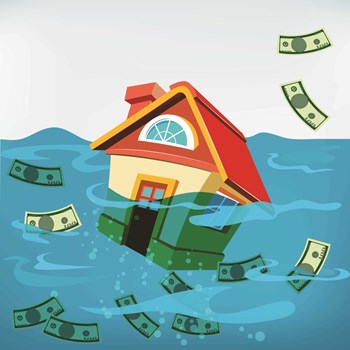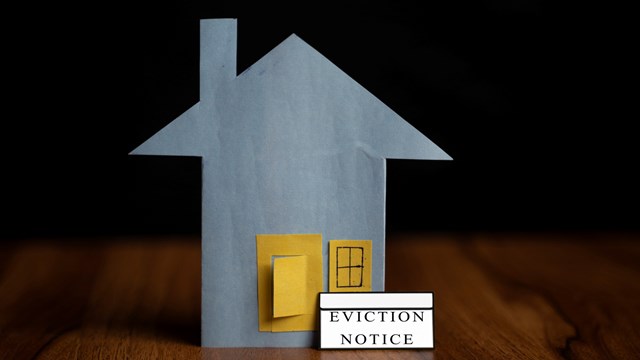
The great majority of co-op and condo residents pay their monthly maintenance fees on time and in full with no problem. People do fall behind on payments sometimes, of course — a temporary cash flow issue or other short-term financial hardship can trip up even the most conscientious HOA member—but even then those folks usually manage to get back on track and catch up.
Sometimes however, the problem is more dire. If late notices and accumulating fines are having no effect, or if the situation shows no sign of resolution, a board must take action – and that action may include foreclosure on the unit in arrears.
Reasons for Foreclosure
The real estate bubble peaked in the middle of the last decade. Prices rose astronomically, inflated by banks eager to dole out enormous loans to buyers whose ability to make monthly payments was suspect, and eventually the system burst. The collapse of the real estate market had ripple effects throughout the economy. Lehman Brothers and Bear Stearns also collapsed, exacerbating a recession. Massive layoffs fueled more foreclosures, which hurt the already-reeling market.
We are still dealing with the aftermath. Condo associations, because they depend on the viability of the individual unit owners, are particularly vulnerable to foreclosures. Boards must be vigilant and keep on top of the financials in their condos.
“It’s the result of the economy right now,” says attorney Janet Aronson, a partner with Marcus, Errico, Emmer & Brooks, P.C., in Braintree, Massachusetts. “We used to have a few foreclosures. Now we have thousands.”
There are other reasons certain units go into arrears, of course. “Sometimes there’s been a dispute with the association, and the owner is withholding payment” as a sort of self-defeating protest, says attorney Michael Merrill, a partner with Merrill & McGeary in Boston.
But those personality-based cases tend to go away once letters from lawyers arrive in the mail. The other cause—the financial one—is more ominous, and more common in this market. “The owner/occupier might be unemployed,” says Howard S. Goldman, a founding partner of Goldman & Pease, a lawn firm in Needham, Massachusetts, “and not have the wherewithal to pay.”
Or the desire. Goldman recalled the owner of a unit in Beacon Hill—not a neighborhood normally associated with financial hardship—who was laid off from her job and found work in New York. The benefits of holding on to the condominium until it could be sold were simply not worth it to her, and she washed her hands of the place, forcing it into foreclosure. “From what I’ve seen, condo fees have been going up,” he says. “At some point, it’s cheaper to live in a rental property.”
And that’s just if the unit is owner-occupied. “In the context of rental properties, the debt on the property is worth more than the value of the unit. This is exacerbated by bad tenants who don’t pay their rent, or find other locations where the rent is cheaper.” In these sorts of investment properties, “the owner has little incentive to pay the fees if it’s upside-down,” Goldman says. “If they’re upside-down, they’re ready and willing to throw in the towel.”
Too many foreclosures in a condominium, especially a small one, can prove devastating to the rest of the owners. This is why it is essential to be vigilant. And why the legislatures in most states in New England have helped out.
The “Superlien”
Under Massachusetts law—as well as Connecticut, Rhode Island, and New Hampshire—an association has an automatic lien when money is owed. This is not particularly helpful, however, if the primary lien is to the bank, and the recouped loss will be less than what the bank is owed. There’s nothing left over.
These states have enacted a so-called “superlien,” a priority lien that moves the association to the front of the line. “Once the requirements are followed, the association will have a priority lien that consists of six months of ‘regular’ monthly common expenses preceding the institution of the legal action, plus the legal fees and costs,” Aronson explains. “Late fees, interest, fines, special assessments and other charges are not protected as part of the priority lien and therefore may not be recovered.”
It the past, she says, lenders have paid the total bill in order to remove the lien. But that was then. “With the increase in delinquencies, we are finding that many lenders are now only willing to pay the priority portion as mandated by the law.”
Although based on the same fundamental principle, the laws vary from state to state in New England. For example, the law says the association must get six months of fees, but when the clock begins differs in Massachusetts and Rhode Island. In New Hampshire, the law only applies to mortgage rates that increased after January 1, 2011—the intent is to shield associations from predatory lending—and therefore hasn’t been much used.
In any event, the superlien is indeed super, if you’re involved with a condo association. “If the bank forecloses, it is subject to the priority lien,” Aronson says. The association has to be paid first. “All is not lost. It’s very beneficial to the association.”
In Vermont, a legal battle is brewing over the six-month stipulation. “The new interpretation of the law is that the intent is to cover the associations for what used to take six months”—that is, for a bank to foreclose—“but now can take up to three years,” says Jack Facey, a partner with Kenlan, Schwiebert, Facey & Goss in Rutland. “The judge said, ‘I’m not going to make condo associations suffer because of gross negligence.’ Another judge agreed with her. But two other judges said, ‘No, I can’t go beyond what the law states.’”
This is ironic, because one of the reasons foreclosures now take so long is to give the owners every opportunity to make good: Society does not benefit from mass foreclosures; it’s to everyone’s benefit if people remain in their homes. This winds up hurting the associations, though, who are responsible for outstanding fees beyond those six months.
Facey and his colleagues are waiting for the case to be brought before the state’s Supreme Court to decide once and for all.
Policies and Timing
At this point, boards should be prepared for the eventuality of a foreclosure. “There should be a policy in place so that when an account is more than 60 or 90 days in arrears, a letter should go out that puts the unit owner on notice,” Goldman says. This is even more important because of the six-month limit placed on the superlien. Because the superlien only covers six months of fees (plus legal costs), it is imperative to not let the arrears period extend.
“The board should have automatic policies for this,” Aronson advises. “It eliminates the need for discussion. It eliminates ‘Oh, this is my neighbor, what are we going to do for this person.’”
There should also be policies for allowing owners to repay the fees, to avoid foreclosure. This happens a lot in these times, as owners lose their jobs, or a spouse’s income. They find another job, they make more money, and then they get caught up.
“We encourage repayment plans,” Aronson says.
The process plays out, with some variation depending on the state, in the same basic way. First, a letter is sent by the board to the delinquent owner after 60 or 90 days of an account being in arrears, stating that further nonpayment will result in the account going to legal counsel. From then, the attorneys take over. A sheriff is dispatched to serve the notice, which takes three weeks. The owner has another 20 days to respond. And then there’s a month or so in court. Ideally, the system takes less than six months to work its way through the system, from the moment the account goes into arrears to the moment the professional auctioneer bangs his gavel to start the auction on the foreclosed property.
But it can take longer—much longer. There are all sorts of delays that creep into the process. If the unit belongs to Dave, and Dave lives two doors down, you can be assured that he will receive his letter. But sometimes the owners of a unit can be hard to unearth. “It may take a long time for the holder of the mortgage to be informed of the lawsuit,” Goldman says.
Many, if not most, cases do not wind up in foreclosure. Sometimes, it’s a matter of notifying the proper party. Other times, an owner who is unemployed or laid off makes a deal with the association to repay the lost fees over time. “Fifteen to 20 percent wind up with a judgment to foreclose,” Goldman says. “Of those, less than half are foreclosed on.”
That number will go down again eventually, as the economy recovers (unless you’re of the contrarian notion that it never will— in which case the recovery of lost association fees is the least of our problems).
“As they foreclose, it is cleaning up some of the dead wood, so to speak,” Aronson says. “I don’t know how much longer it will last, but it does seem to be working.”
Greg Olear is a freelance writer and a frequent contributor to New England Condominium.






Leave a Comment